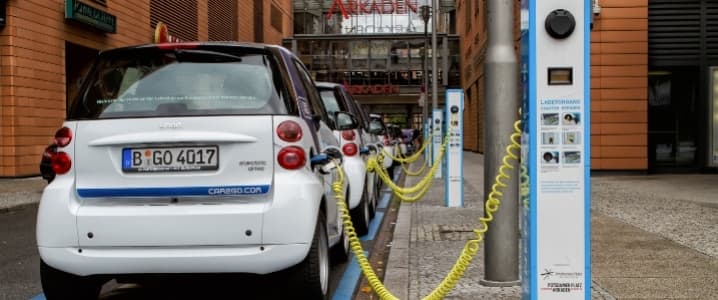Germany currently has a plan to usher in renewable energy: 100 percent of cars on the streets will be electric. However, as it stands, the plan to create the world’s first 100 percent electric vehicle country would actually increase emissions – an unintended consequence of what appears to be a good-natured piece of legislation. Indeed, if Germany reaches their goal of 100 percent EV, their emissions would increase by the amount produced by present day Uruguay or the entire state of Montana.
The plan to phase-out all gasoline vehicles by the year 2030 is not official governmental policy. The Bundesrat, Germany’s legislative body, called for bipartisan support of this phase out in October 2016, in accordance with the Paris agreement. Even without official legislation, the headlines alone send a clear message to the German auto industry; it takes 10 times more staff to manufacture a carbon-based vehicle when compared to its electric counterpart. Thousands would be out of work if such legislation existed and if automakers did not adapt accordingly.
Moreover, such a plan would not achieve the decrease in emissions it seeks. Environmentalists, of course, are eager to see such a resolution banning carbon-based vehicles from German markets, as they comprise a large portion of total emissions. As with all politics, however, it isn’t that simple.
An electric car creates more emissions than a car burning petrol fuel if the power to charge that car was generated by coal or gas, in the first place. Currently in Germany, it would be. For this ban to be effective at reducing emissions on a net level, a switch to an entire grid of renewable energy must first occur – this is unlikely to happen anytime soon.
Angela Merkel announced that the country would be slowing down their expansion into new wind turbine farms, as they were creating too much intermittent power, creating an unstable grid. Furthermore, Germany is retiring its entire nuclear reactor fleet by 2022, a result of the Fukushima travesty. Related: Iran And Iraq To Ramp Up Oil Production Despite OPEC Cuts
While electric vehicles are indeed more efficient than petrol vehicles, the transition would require an enormous amount of energy to be added to the grid – 258 terawatt-hours. It seems that the government is opposed to further expansion into renewable energy sources, and the country has already maximized its potential in hydro, geothermal, and biomass.
Therefore, the gap would likely have been filled by coal or natural gas, each of which would produce 260 million tons or 131 million tons of carbon dioxide, respectively. For comparison’s sake, current road transportation in Germany contributes approximately 156 million tons of carbon dioxide. Unless the 258 terawatt-hour gap is filled entirely with renewable energy, Germany could very well experience a net increase in emissions as a result of this carbon-vehicle ban.
Even if half of the gap was filled by coal, and the other half by natural gas, and even if both increased their efficiency by 25 percent, analysts still expect total emissions to increase by 20 percent. This is the most likely scenario for Germany’s future if a ban is indeed implemented. If Germany is truly intent on reducing the amount of emissions they contribute to the atmosphere, this policy needs to be rethought.
By Michael McDonald for Oilprice.com
ADVERTISEMENT
More Top Reads From Oilprice.com:
- U.S. Shale Kills Off The Oil Price Rally
- Is The Oil Price Plunge A Turning Point?
- Oil Prices Continue Plunging As Speculators Rush For The Exit



















Does this mean that the price of electricity will also be increased to take the place of the "gas tax"?
Or will the Government of the day add taxes elsewhere so that electricity does not have to be increased?
The money for the roads MUST come from somewhere!!!!!!
http://shrinkthatfootprint.com/electric-car-emissions
The grid will get cleaner over time and EVs today cause fewer net emissions than average gasmobiles, and will only get better over time as the grid gets cleaner.
Germany is slowing down their wind fleet rollout because they've maxed out their transmission grid. A new HVDC line is being constructed from the Baltic to Southern Germany, where they need to send the power. Massive new wind farms in the middle of the Baltic are being planned and will move forward once this line is in place. The line itself will take awhile, as they are under-grounding it. China is also building a national HVDC grid. We should be doing the same.
Natural gas is already losing out to wind in Texas and will be far cheaper than Russian gas over the long term, plus no geopolitical risk.
Batteries are at their nascency, but already beat gas peaker plants on economics and rapid installation, they will start taking market share at the top and as costs fall, will gradually take a bigger slice of the peaker market.
Self sufficiency would mean for the business owner to put some solar on the roof of the business building, harvesting cheap kWh for the business trips or as a reward for your employees,
or as a private car owner in the suburbs have your own carging solar carport, probably with a home storage system added.
-> near to zero coal on the road
But that is just the people I talk to. The only point is the "if", most are waiting.
2. Energy companies already motivate (via lower price of electricity) users to run power hungry equipment (like charging EVs) at the time when they have excess capacity (usually at night, but can happen at different times in places like Germany that get large % of electricity from wind) so very littler extra generating capacity would be needed, since almost all EVs would charge when the price is low - peak power demand would stay similar.
Cars running on electricity would be 29% renewable (Germany 2016).